×


We have detected your country as:
Please click here to go to the USA website or select another country from the dropdown list.
by: Janet Aslin, BFP Staff Writer
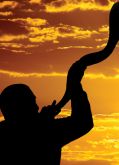
The biblical account of Gideon and his defeat of the Midianites during the period of the Judges is one that every Sunday School child has heard at least once. I was certainly among that group as I was growing up. Later, as an adult in Bible college, the story of Gideon surfaced in my life again. It happened between classes as I was with a group of friends. These words came unexpectedly from my mouth, “I want to be like one of the 300 that Gideon chose.” I remember being quite surprised, maybe even shocked, because I did not consider myself very courageous or bold. What can we learn from Gideon? I invite you to travel back to the days of the Judges as we examine the life and times of one of God’s valiant warriors.
The book of Judges covers the transitional period between the death of Joshua, Moses’ appointed successor, and Saul, Israel’s first king. Under Joshua’s leadership, the Israelites fought many battles and claimed part of their inheritance. However, many of the Canaanite residents remained in the land. We read, “And it came to pass, when Israel was strong, that they put the Canaanites under tribute, but did not completely drive them out” (Judg. 1:28).
In the chapters that lead up to the account of Gideon, we see a predictable cycle. Under strong leadership, Israel served the Lord. However, during periods when there was not a strong leader, Israel failed to obey God and instead turned to the religion of the Canaanites who still lived among them. They became weak as “…He sold them into the hands of their enemies all around, so that they could no longer stand before their enemies” (Judg. 2:14b).

Photo credit: sababa66/shutterstock.com
It was at just such a desperate time that Gideon received his call from the Lord. The Midianites had been terrorizing Israel for seven years. A nomadic people, the Midianites and their allies, the Amalekites, along with other “people of the East,” swept over the Land. Edersheim, in his book The Old Testament Bible History, offers this description, “Theirs was not a permanent occupation of the land, but a continued desolation. No sooner did the golden harvest stand in the field, or was stored into garners, than they unexpectedly arrived. Like a plague of locusts, they left nothing behind.” “So Israel was greatly impoverished because of the Midianites, and the children of Israel cried out to the LORD” (Judg. 6:6).
Gideon was the youngest son of Joash (יואש), and a member of the Abiezrite clan of the tribe of Manasseh. His name, Gideon (גדעון), means “hewer” (Strong’s H1439) in biblical Hebrew and was derived from the verb gadah (גדע), to chop down, cut in two, or hew down. Gideon seemed an unlikely choice as the one to lead his people but the Lord did not follow the conventional wisdom of man when making His selection. A footnote in The Living Nach, a translation based on traditional Jewish sources says, “God often chooses the youngest, to demonstrate that salvation does not depend on power, age, or wisdom, but on His Word.”
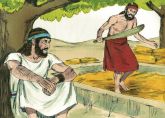
Photo credit: www.sweetpublishing.com
As the account continues we read that “the Angel of the Lord” came to visit Gideon while he was “threshing wheat in the winepress in order to hide it from the Midianites” (Judg. 6:11). Usually wheat was threshed in an open area, not an enclosed winepress. One could imply a lack of bravery because Gideon was hiding his activities, however a reading of the entire biblical account does not support that idea. His was a practical response to the circumstances in which Israel found itself and may also have indicated there was a limited amount of wheat to be threshed.
As for Gideon’s character, Nelson’s Illustrated Bible Dictionary tells us that “the tribe of Manasseh was known for its valor” which agrees with the Angel’s words of greeting, “The LORD is with you, you mighty man of valor!” (Judg. 6:12b). Gideon didn’t dispute the Angel’s description but instead questioned the current state of affairs. If God was with them, why was there so much suffering?
Rather than answer the “why” of Gideon’s question, instead “…the LORD turned to him and said, ‘Go in this might of yours, and you shall save Israel from the hand of the Midianites. Have I not sent you?’” (Judg. 6:14). Now Gideon raised another question, “O my Lord, how can I save Israel? Indeed my clan is the weakest in Manasseh, and I am the least in my father’s house” (Judg. 6:15).
Both questions were those of one seeking to understand. Why had God allowed His people to suffer? How could I, a member of the most insignificant clan in my tribe, living in an out-of-way community, save Israel? Again, the Lord did not answer directly, saying only, “But I will be with you…” (Judg. 6:16a).
The Lord may not answer our “why” or “how” questions but He does give us the assurance of His presence.
Who was this divine Messenger? At his first appearance, we read, “Now the Angel of the LORD came and sat…” (Judg. 6:11). Notice that it was not “an” angel of the LORD but “the” angel of the LORD. Several translations, including the NKJV, capitalize the word angel in this passage which indicates divinity. There is also support for this identification when, in verses 14 and 16, Scripture simply says “the LORD.” The Hebrew word used here for LORD is the unpronounceable name of God, Yod-Heh-Vav-Heh (יהוה) which English-speakers often translate as Yahweh.
How did Gideon respond to this encounter? He built two altars. The first was done as a personal act of faith; the second, built in obedience to the command of the Lord, involved the destruction of the community’s pagan altar to Baal and was corporate in nature.
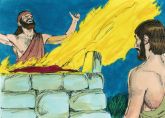
Photo credit: www.sweetpublishing.com
First altar: Although he may have suspected, it appears that Gideon did not know the identity of his divine Visitor until his offering was accepted. When the fire rose out of the rock on which Gideon had placed the cooked meat and the unleavened bread, and the Angel vanished, he knew he had had a divine encounter. In reverence and awe, Gideon cried, “Alas, O Lord GOD! For I have seen the Angel of the LORD face to face” (Judg. 6:22b). After the Lord reassured Gideon, he built an altar which he called “The Lord Is Peace.” This is similar to the altars built by Abraham and Jacob when God appeared to them (Gen. 12:7, 35:7).
Second altar: That same night, the Lord gave Gideon specific instructions with regard to the altar of Baal that was in a central area of Ophrah, his hometown. He was to take his father’s second bull, the one that was seven years old, and tear down the pagan altar. In addition, he was to cut down the wooden image, most likely an Asherah pole, that stood beside the foreign altar. Once this was accomplished, he was to build a new altar in a very prominent place.
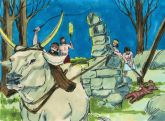
Photo credit: www.sweetpublishing.com
Gideon obeyed God. I’m sure it took a considerable amount of courage to demolish Baal’s altar and cut down the Asherah pole. After all, he was the youngest son and “the least in his father’s house” (Judg. 6:15b). However, I think Gideon may have gotten a bad rap when Scripture says he was too afraid of his father and the rest of the town to tear down the altar during the day. I want to suggest another way to look at this: it was at night that God spoke to Gideon and, in spite of his fear, he obeyed immediately, tearing down the altar “that same night.”
The next morning when the men of the town saw what had been done, they demanded that Gideon be brought before them and put to death. His father Joash intervened and essentially said, “If Baal is real, let him defend himself since he is the one whose altar was torn down.” When nothing happened, the tide of opinion changed to full support of Gideon and his new leadership role. In fact, Gideon received a second name that day. His father called him “Jerubbaal” or literally, “Let Baal Plead.”
Step by step, the Lord took Gideon from the role of a farmer threshing his wheat to that of a leader in his clan. At each point, Gideon responded by choosing to believe what God said to him. During a time of preparation, first there must be a personal encounter with God. One cannot be a leader of men unless one has “done business” with God on an individual level. Gideon passed the test and was ready for the next step.
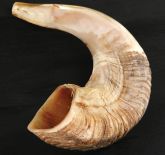
Photo credit: www.shutterstock.com
Assured that he had heard from the Lord and vindicated from the wrath of the other Abiezrites over the destruction of Baal’s altar, Gideon took his place of leadership. When “…the Spirit of the LORD came upon Gideon…” (Judg. 6:34a), he blew the shofar (trumpet) and sent messengers to summon the surrounding tribes of Asher, Zebulun and Naphtali to join his own tribe of Manasseh as they prepared to fight.
After the messengers left, Gideon asked for a second sign. He took materials that would certainly have been easily available in the culture of the day and asked that the physical laws of nature be suspended—a fleece placed on the ground overnight to be filled with dew while the earth remained dry. When this was exactly what happened, the following night Gideon asked for a reversal—dry fleece, wet earth. Again, God graciously complied with his request.
Was there a special meaning in these signs? As I read commentaries and footnotes in study Bibles, I encountered various interpretations of what these two signs might mean. They were interesting but I would rather consider what the signs reveal about God’s nature. He did not need to prove that He really was going to do what He said but He chose to answer Gideon’s requests for verification.
God knows our weaknesses—what we are like. Personally, I have always taken comfort in the fact that God does, indeed, know what I am like and that I often need reassurance. “As a father pities his children, so the LORD pities those who fear Him. For He knows our frame; He remembers that we are dust” (Ps. 103:13–14). Furthermore, He does not leave us in time of need for as we read, “Fear not, for I am with you; be not dismayed, for I am your God. I will strengthen you, yes, I will help you, I will uphold you with My righteous right hand” (Isa. 41:10).
The Israelites answered Gideon’s call to war—32,000 of them. They faced an enemy force of 135,000, more than four times as large. Those weren’t very good odds. Yet God told Gideon, “The people who are with you are too many for Me to give the Midianites into their hands, lest Israel claim glory for itself against Me, saying, ‘My own hand has saved me’” (Judg. 7:2).
It is sad but true that unless we are faced with insurmountable challenges, there is always the temptation to claim that our own strength has somehow won the victory. To live a life totally dependent upon God’s strength does not come naturally; it is gained as we humble ourselves and submit to Him day by day.
Following the Lord’s instructions, Gideon dismissed those who were afraid and 22,000 men went home. The next step was a visit to the spring where the remaining 10,000 were put to a test that would further reduce the number of Gideon’s army. The majority of the men knelt to drink, while a few lapped with their tongues. God told Gideon to choose those who lapped.
In their book Battles of the Bible, Chaim Herzog and Mordechai Gichon, two modern-day Jewish warriors, offer this explanation of why the men who lapped were selected over those who knelt down to drink. “The men chosen were those who, in spite of their thirst, remained cautious of the presence of the enemy nearby and did not abandon their weapons even when drinking, which they managed to do by lying down on their bellies and lapping up the water with their tongues.”
A second suggestion appears in the Living Nach: “Kneeling was symbolic of Baal worship (see 1 Kings 19:18), and true Israelites did not kneel.” Whether or not one of these explanations is correct, we know for certain that it was the Lord who devised the test and chose the 300 men who would accompany Gideon. “I [the Lord] will test them for you there. Then it will be, that of whom I say to you, ‘This one shall go with you,’ the same shall go with you; and of whomever I say to you, ‘This one shall not go with you,’ the same shall not go” (Judg. 7:4).
In obedience to the Lord, Gideon sent 9,700 men back to their homes and retained the 300 whom the Lord had chosen. The biblical account tells us that “…the camp of Midian was below him in the valley” (Judg. 7:8b). It was nighttime when the Lord spoke again to Gideon and told him it was time to attack. We see yet another piece of evidence of just how well the Lord knows His children and of His kindness toward us. He offered Gideon one more opportunity to know with absolute certainty that he would be victorious. “But if you are afraid to go down, go down to the camp with Purah your servant, and you shall hear what they say; and afterward your hands shall be strengthened to go down against the camp…” (Judg. 7:10-11b).
When Gideon and Purah arrived at the outpost, they heard one of the Midianite guards telling his companion about his dream. Edersheim writes that both the “dream and its interpretation…would make the deepest impression on those sons of the desert… Barley-bread was deemed the poorest food; yet a loaf of this despised provision of slaves rolls itself into Midian’s camp, strikes the tent of the leader, turns it upside down and it falls! Here is a dream-picture of Israel and its victory….”
 Gideon and Purah returned to their camp and gave their final instructions. We know the story—300 men descended upon the enemy camp, blew their trumpets and with one voice shouted, “For the Lord and for Gideon!” as they broke the jars hiding their torches. The sudden appearance of light and sound must have been overwhelming to the Midianites who responded by fleeing into the night. During the ensuing flight, Scripture tells us that 120,000 of the vast Midianite army were killed.
Gideon and Purah returned to their camp and gave their final instructions. We know the story—300 men descended upon the enemy camp, blew their trumpets and with one voice shouted, “For the Lord and for Gideon!” as they broke the jars hiding their torches. The sudden appearance of light and sound must have been overwhelming to the Midianites who responded by fleeing into the night. During the ensuing flight, Scripture tells us that 120,000 of the vast Midianite army were killed.
In their analysis, Herzog and Gichon write, “the fugitives seem to have divided into two main bodies. The quickest, under the leadership of Zebah and Zalmunna, succeeded in crossing the Jordan, and hastened towards the wilderness, while the main body of the army, encumbered with women and cattle, fled in a south-easterly direction…” Gideon and his small band of men pursued those led by Zebah and Zalmunna while the Ephraimites intercepted the larger force led by Oreb and Zeeb, whom they killed.
After he successfully calmed the Ephraimites, angry that they had not been called to take part in the original battle, Gideon and his 300 exhausted men continued their pursuit. When he stopped at the town of Succoth to ask for bread to feed his hungry fighters, Gideon was rebuffed by their leaders who refused to provide any supplies since he had not yet captured the Midianite kings. Gideon replied that “when the LORD has delivered Zebah and Zalmunna into my hand, then I will tear your flesh with the thorns of the wilderness and with briers!” (Judg.8:7).
Gideon repeated his request for provisions at Penuel “and the men of Penuel answered him as the men of Succoth had answered” (Judg. 8:8). This time, rather than promise to beat the men of the city, Gideon vowed to tear down the tower of their fortified city. In fact Gideon made good on both promises and although both cities had given him the same answer, he treated them very differently. Gideon “taught the men of Succoth,” by punishing their rulers…while in the case of Penuel, which seems to have offered armed resistance to the destruction of its citadel, ‘the men of the city’ were actually slain” (Edersheim).
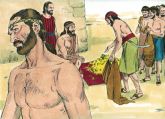
Photo credit: www.sweetpublishing.com
Once the Midianites were defeated, the men of Israel asked Gideon to establish a dynastic kingdom and rule over them. Without hesitation, he replied that neither he nor his sons would rule over them; the LORD would rule. Gideon won that internal battle but his next step brought tragedy, not only for himself and his own immediate family but for the nation of Israel. Gideon allowed himself to take a step independent of the Lord’s leading and guidance. He asked the people to give him the golden earrings they had taken in plunder from the Midianites. The men gladly agreed and soon collected a pile of earrings that weighed 1,700 shekels of gold, the equivalent of 43 pounds.
Gideon took the gold and “made it into an ephod and set it up in his city, Ophrah. And all Israel played the harlot with it there. It became a snare to Gideon and to his house” (Judg. 8:27). There is some uncertainty as to the exact purpose and form of the ephod Gideon made. According to the Jewish Encyclopedia, the word “ephod” has two distinct meanings in the Tanakh (Gen.–Mal.). We are probably most familiar with the ephod as a part of the official dress of the high priest. The second use of the word ephod is as an image which seems more appropriate here. In the Living Nach, footnotes suggest that Gideon may have made “a golden belt (Radak, Ralbag) to commemorate his victory. Others suggest that this ephod was used for divination.”
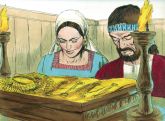
Photo credit: www.sweetpublishing.com
Regardless of its form, the Bible tells us that it was a snare to Gideon and his family. If it was a commemoration of his victory, perhaps Gideon fell into the snare of pride and forgot his utter helplessness to achieve anything apart from the Lord. If it was used for divination, or the seeking of wisdom by the aid of the supernatural, it would be a violation of God’s instruction given through Moses of the way His people were to live. Among the many rules was this one: “…nor shall you practice divination or soothsaying” (Lev. 19:26b).
While Gideon lived, the land had rest and peace but we read that “…as soon as Gideon was dead, the children of Israel again played the harlot with the Baals…” (Judg. 8:33 emphasis added). In contrast, when Joshua died, Israel continued to serve the Lord during the days of the elders who lived during his time (Josh. 24:31). In Gideon’s case, he did not leave such a legacy. Immediately after his death, the people fell away from worship of the true God and began to worship Baal.
What can we learn from Gideon’s life? He wasn’t afraid to come to the Lord with his questions during the time of preparation. He was quick to obey. He was a brilliant military leader who, clothed by the Spirit of God, soundly defeated the Midianites. He knew that the Lord is the true King and refused to accept the crown when it was offered. Yet, he fell into a trap after his miraculous military victory.
Still, we find Gideon’s name listed among the heroes of the faith. “And what more shall I say? For the time would fail me to tell of Gideon and Barak and Samson and Jephthah, also of David and Samuel and the prophets: who through faith subdued kingdoms, worked righteousness, obtained promises, stopped the mouths of lions, quenched the violence of fire, escaped the edge of the sword, out of weakness were made strong, became valiant in battle, turned to flight the armies of the aliens” (Heb. 11:32–34).
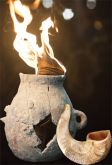
Photo credit: StockPhotosLV/ shutterstock.com
Was he a failure in the end? Not a failure but perhaps a man from whose life we can learn the lesson that nothing short of 100% obedience to the Spirit of the Lord will protect us from falling into snares that will entrap us.
It is good to study the lives of the biblical heroes listed in the “Hall of Faith.” As we do, we can see that they were men and women with human failings, just as we are. We can take hope from God’s faithfulness to Gideon and to us. “Now to Him who is able to keep you from stumbling, and to present you faultless before the presence of His glory with exceeding joy…” (Jude 24). He who promised is faithful!
Elman, Yaakov. The Living Nach, Early Prophets. Jerusalem: Moznaim Publishing
Corporation, 1994.
Herzog, Chaim and Mordechai Gichon. Battles of the Bible, a modern military evaluation
of the Old Testament. New York: Random House, 1978.
Kantor, Mattis. The Jewish Time Line Encyclopedia. Northvale, New Jersey:
Jason Aronson Inc., 1989.
Lockyer, Herbert Sr., ed. Nelson’s Illustrated Bible Dictionary. New York:
Thomas Nelson Publishers, 1986.
Strong, James, LL.D., S.T.D. The New Strong’s Exhaustive Concordance of the Bible.
Nashville: Thomas Nelson Publishers, 1990.
All logos and trademarks in this site are property of their respective owner. All other materials are property of Bridges for Peace. Copyright © 2025.
Website Site Design by J-Town Internet Services Ltd. - Based in Jerusalem and Serving the World.